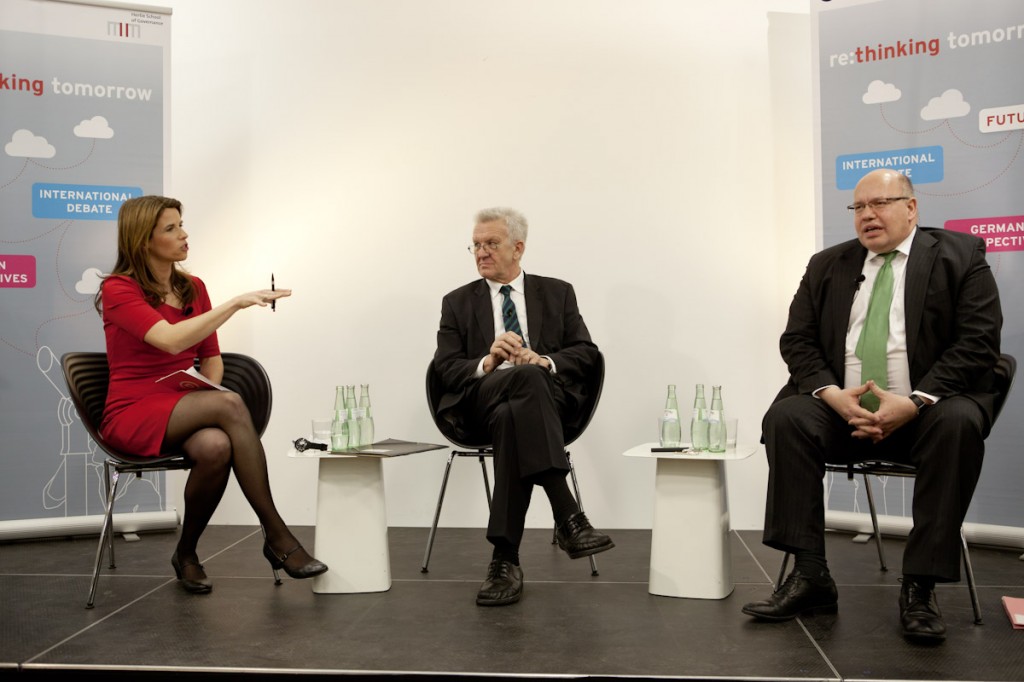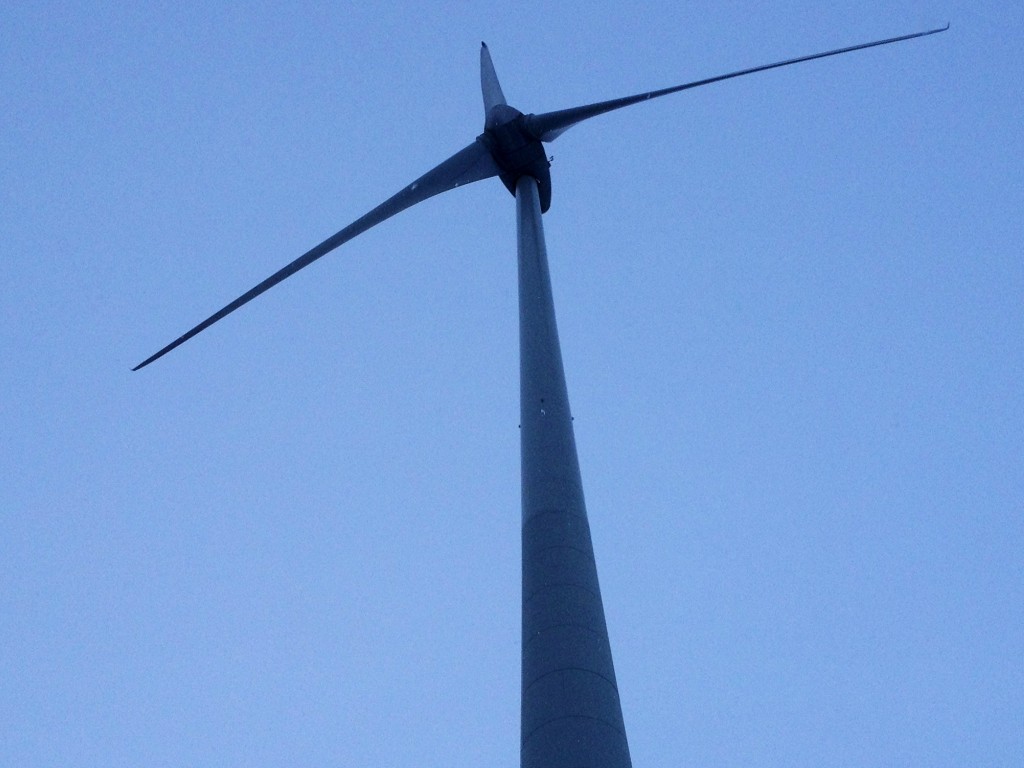Search Results for Tag: energy transition
Germany’s not-so-smooth energy transition

Participants at Deutsche Welle’s Global Media Forum 2013. Are they surprised that the ship hosting the opening party runs on polluting diesel rather than clean solar power?
It’s a revolutionary project – Germany plans to meet 80 percent of its electricity needs with wind, sun and other renewable energy sources by 2050. In June 2013, Global Ideas hosted a high-level panel to debate Germany’s “Energiewende” (energy transition) – the country’s biggest infrastructure project since 1945. The debate was part of Deutsche Welle’s “Global Media Forum” in Bonn.
We asked our high-profile panel guests – Is Germany’s green revolution a role model for other countries or could it turn into a nightmare for German citizens with costs exploding? Global Ideas’ Kerstin Schnatz has more.
Energy transition challenges

Claudia Kemfert, head of the Department of Energy, Transportation, Environment at the German Institute of Economic Research (DIW), Berlin
Professor Claudia Kemfert from The German Institute for Economic Research (DIW) stressed, that despite 42 percent of all investments in renewable energies coming from citizens rather than big companies, the energy revolution is still under real threat. The German government provided the wrong incentives for a real green revolution favoring fossil fuels, such as coal, she said. “ We had thought that CO2 prices would solve the problem – but the fact is they don’t,“ Kemfert said, saying that explained why coal power still dominates Germany’s energy mix.
Kemfert, who was recently appointed shadow environment minister in the state of Hesse, warned that Germany had to be weaned off its reliance on coal. “Investments into coal power plants are still too cheap. But when new coal power plants are built today, we will be tied to them for the next 40-60 years until they are paid off,“ Kemfert said.
She admitted that fossil fuels are still needed for the transition phase, but she hopes to see more gas rather than coal as it is less polluting. Though solar power already provides 60 percent of Germany’s electricity needs on a sunny day, gas is still needed for cloudy and windless days, Kemfert said.
‘Dash for gas’
But British environmental journalist Fiona Harvey from the Guardian newspaper did not agree with Kemfert. “Gas is not a low carbon fuel,” the London-based expert on climate change issues said. Harvey warned that Britain’s “dash for gas” may turn into a big problem in the future when gas prices, which tumbled temporarily due to new extraction methods such as shell gas, rise.
According to Harvey, Britain needs an energy transition that increases the percentage of renewable energies from a current 5 percent of the overall energy mix. In Germany, renewables account for over 25 percent. “Only one fuel to rely on is not a good idea,“ Harvey warned, making the case for a green revolution where neither sun nor wind cost anything at all. She said she hoped Germany becomes a role model proving to other countries that a green revolution is possible.
New coal power plants

Franzjosef Schafhausen, head of Section Transformation of the Energy System, Federal Ministry for the Environment, Nature Conservation and Nuclear Safety (BMU)
Moderator Michaela Küfner’s question about whether Germany was intentionally headed for coal was anwered with an emphatic ‘no’ by Franzjosef Schafhausen, who represented the German federal ministry for the environment, nature conservation and nuclear safety.
Schafhausen admitted that new coal power plants are being built in some places – such as the 1.100 Megawatt MW plant Datteln IV in North Rhine-Westphalia. But at the same time, he stressed that Germany’s energy transition policy meant that “no company is prepared to make new investments in coal at the moment.”
Schafhausen who chairs the ministry’s department for the energy transition would like to see the carbon trading system reactivated, hoping to put a higher price on CO2 and thus making coal even less attractive for big companies.
Exploring the North – rare earths crucial for renewable energy
Below the Scandinavian snow cover, there are even more resources (apart from ice) that make the North special. Mining is a big deal in this region, especially in Sweden. From copper, iron ore to gold, the country is rich in minerals and metals – in fact, it is the largest mining region in Europe. So it’s not that surprising to find some real precious treasures in the Swedish ground – rare earths. They are not only important for smartphone chips and laptop processors, but also play a crucial role in renewable energy technology and thus in energy transition, helping the world to emit less CO2.
These non-renewable resources for renewable energy technology have strange names – dysprosium can be found in magnets that are used to run generators in wind power stations. Ytterbium is used for tubes in reactor technology, neodymium is important for the engines of electro- and hybrid-cars. Terbium can in turn be found in semiconductors important for building solar cells.
They are all found in Norra Karr and Olserum, two (potential) mining sites in Sweden. They are owned by the Canadian mining company Tasmet, which has applied for permission to mine in Norra Karr and is exploring the site in Olserum. Both are the only (so far known) sites in the European Union, where rare earths can be found. So far, the largest producer is China – producing 97 percent of the world’s rare earths in 2009. These metals are used all around the world and demand is projected to rise from 130,000 tons per year in 2012 to 186,000 tons in 2015. One already senses where problems might arise.
At the end of 2010, China restricted export of rare earths for the first time, putting the EU’s energy strategy at risk. What’s more, car manufacturers such as General Motors or Toyota searched for (and claimed to nearly have found) alternatives to become more independant. But so far, there don’t not seem to be alternatives that are feasible on a large scale. Which is why, even small deposits are still lucrative to mine and researchers are keen on finding new ways of mining.
Now you might think this isn’t my problem but rather that of big manufacturers. Well, you are almost right. We all have small earth desposits in old computers, TV monitors and outdated mobile telephones stored in our cellars and attics. Aware of possible shortages of the metals, the electronics industry is aiming to develop feasible recycling methods for rare earths that are still not in place.
So, if some day we do have these proper recycling methods in place, keep your attic-treasures in mind…they just might contribute to something big:
Germany’s energy transition “biggest challenge since World War II”

How much should Germany’s “Energiewende,” a move towards ramping up renewable energy, cost? That question was the main sticking point at a lively debate on Wednesday between German Environment Minister Peter Altmaier (a member of the governing Christian Democratic Party) and the Green Party’s first state premier in Baden-Württemberg, Winfried Kretschmann. The discussion at the Hertie School of Governance was part of an ongoing series of events called “Re:Thinking Tomorrow.” The events are co-organized by Deutsche Welle, which is also a media partner.
The energy transition which involves phasing out nuclear and fossil fuels has sparked huge international interest and remains a hot-button issue in the country. In an interview with Global Ideas, Environment Minister Peter Altmaier said the transformation of Germany’s energy system “is the biggest challenge since the Second World War.” “It means a complete transformation of the backbone of Germany’s economy and business,” he added.
Altmaier went on to speak about the technical and financial challenges in scaling up renewables and phasing out nuclear energy as well as how Germany can build on its reputation as a pioneering power in green issues.
All about the German energy turnaround (Energiewende) – statement Peter Altmaier @ Hertie School from DW_Global Ideas on Vimeo.
Both Altmaier and Kretschmann are considered political heavyweights when it comes to climate and environmental issues, which made for some amusing and lively verbal exchanges. Kretschmann began by accusing Altmaier of unsettling voters. “People already mix up millions and billions,” he said, adding “and now you are talking about trillions!” That elicited quite a few laughs from the audience. A few weeks ago, Altmaier had said Germany’s energy transition would cost energy consumers up to one trillion Euros if certain measures weren’t taken such as putting brakes on electricity prices.
Both participants agreed that Germany’s energy transition has to be an ecological and economic success if it is to find wide acceptance both within Germany and beyond. Germany may only be responsible for three percent of the world’s CO2 emissions, they argued. But if it managed to successfully pull off its ambitious energy transition project and move towards a low-carbon economy, it could offer vital lessons for big polluters such as China. That’s why, they stressed, it remains important not to jeopardize the energy project.
Kretschmann said the energy transition had already led to green growth with jobs and opportunities generated in the renewables sector. To keep things this way, Environment Minister Altmaier said brakes had to be put on electricity prices. The turnaround has to stay affordable for everyone, he added.
Kretschmann underlined the positive effects of the energy turnaround in the future. In the long run, consumers will pay less for electricity, Kretschmann argued, saying “the sun, after all, doesn’t send you any bills.”






Feedback